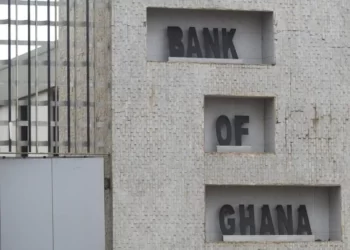Ghana’s corporate financing corporate is on the cusp of a major transformation as Absa Bank Ghana champions the use of Debt Capital Markets (DCM) instruments as viable alternatives to traditional bank loans.
The move, according to the bank, represents a sustainable and forward-looking approach to corporate funding amid Ghana’s improving macroeconomic stability and rising investor confidence.
At a high-level Debt Capital Markets Funding Workshop held in Accra, Absa Bank brought together regulators, institutional investors, and corporate leaders to deliberate on strategies to unlock new financing opportunities through notes, bonds, and commercial paper.
The event, themed “Unlocking Debt Capital Markets Financing: Diversifying Funding Sources for Competitive Advantage,” underscored the need for corporates to diversify funding sources and leverage Ghana’s deepening capital market for long-term growth.
A Call to Rethink Corporate Financing
Delivering the opening remarks, Dr. Ellen Ohene-Afoakwa, Managing Executive for Corporate and Investment Banking at Absa Bank Ghana, called on businesses to look beyond conventional bank lending and explore the opportunities available in the capital market.
“Corporate funding is moving beyond traditional bank lending. The capital market offers a credible, complementary avenue for businesses to diversify their funding sources, and Absa Bank stands ready to connect issuers and investors through expert advisory and innovative solutions.”
Dr. Ellen Ohene-Afoakwa
She explained that the strengthening macroeconomic environment and improving market confidence make it an opportune moment for corporates to consider issuing bonds and other debt instruments to fund expansion, manage liabilities, or refinance existing debt under more favorable terms.
Tapping into Ghana’s GHS 93 Billion Liquidity Pool
Dr. Ohene-Afoakwa revealed that Ghana’s fund-management industry now manages assets estimated at GHS 93 billion as of the second quarter of 2025, citing data from the Securities and Exchange Commission (SEC). This pool of liquidity, she noted, could be channeled into productive sectors if more corporates accessed the debt market.
“There is enormous local liquidity waiting to be unlocked for productive use. The capital market connects this liquidity with businesses that need long-term funding. The more we build trust and transparency in this system, the more we strengthen Ghana’s overall financial ecosystem.”
Dr. Ohene-Afoakwa
Speaking on behalf of the Ghana Fixed Income Market (GFIM), Mr. Augustine Simons commended Absa Bank for its sustained commitment to promoting capital-market education and engagement. He noted that fixed-income trading activity continues to strengthen, with the GFIM achieving remarkable milestones since its establishment in 2015.
“Since inception, the Ghana Fixed Income Market has recorded more than GHS 1 trillion in cumulative trading volume and over GHS 24 billion in corporate issuances,” Mr. Simons disclosed. “As of September 2025, traded volume had already reached GHS 185 billion, and we expect to hit GHS 250 billion by year-end.”
He added that the market’s liquidity and transparency make it an attractive platform for corporate issuers.
“The market is ready for more corporates to take advantage of its depth. Over the next decade, GFIM’s focus will be on expanding the corporate-bond segment through sustainability, digital innovation, and regional integration—positioning Ghana as a capital-market hub in Africa.”
Dr. Ohene-Afoakwa
Regulatory Support for a Thriving Debt Market
Representing the Securities and Exchange Commission (SEC), Mr. Macnamara Peter-Brown highlighted the regulatory framework that underpins Ghana’s debt-capital-market operations.
He mentioned that the SEC’s efforts to strengthen market integrity and investor confidence are guided by key legislative instruments, including the Securities Industry Act, 2016 (Act 929), the Companies Act, 2019 (Act 992), and the Corporate Bond Issuance Guidelines. “Compliance lies at the heart of market confidence. Our role as regulator is not to impose hurdles but to protect investors, sustain transparency, and ensure that issuers raise funds responsibly,” Mr. Peter-Brown explained.
He further revealed that corporate-bond funding currently accounts for only about 1 percent of Ghana’s GDP, compared with 45 percent in the United States, highlighting a significant opportunity for Ghanaian firms to deepen domestic corporate issuance to support private-sector expansion.
Analysts at the event agreed that Absa’s DCM initiative aligns with broader improvements in market stability and liquidity. By encouraging companies to issue bonds, Absa aims to help reduce dependence on short-term bank loans, lower financing costs, and create a healthier balance between debt and equity financing across the corporate sector.
Dr. Ohene-Afoakwa reiterated that Absa Bank’s goal is to act as a bridge between issuers and investors, leveraging its regional expertise and advisory strength to structure attractive instruments that meet both parties’ objectives.
“At its core, this is about partnership,” she said in closing. “By connecting corporate ambition with investor capital, we can unlock funding that drives economic growth and empowers Africa’s tomorrow—together.”
The workshop concluded with a strong call for collaboration among issuers, arrangers, regulators, and investors to build a resilient ecosystem that supports Ghana’s development agenda.
READ ALSO:SSNIT Calls for Urgent Overhaul of Pensions Act to Protect Ghana’s Gig and Digital Workers























